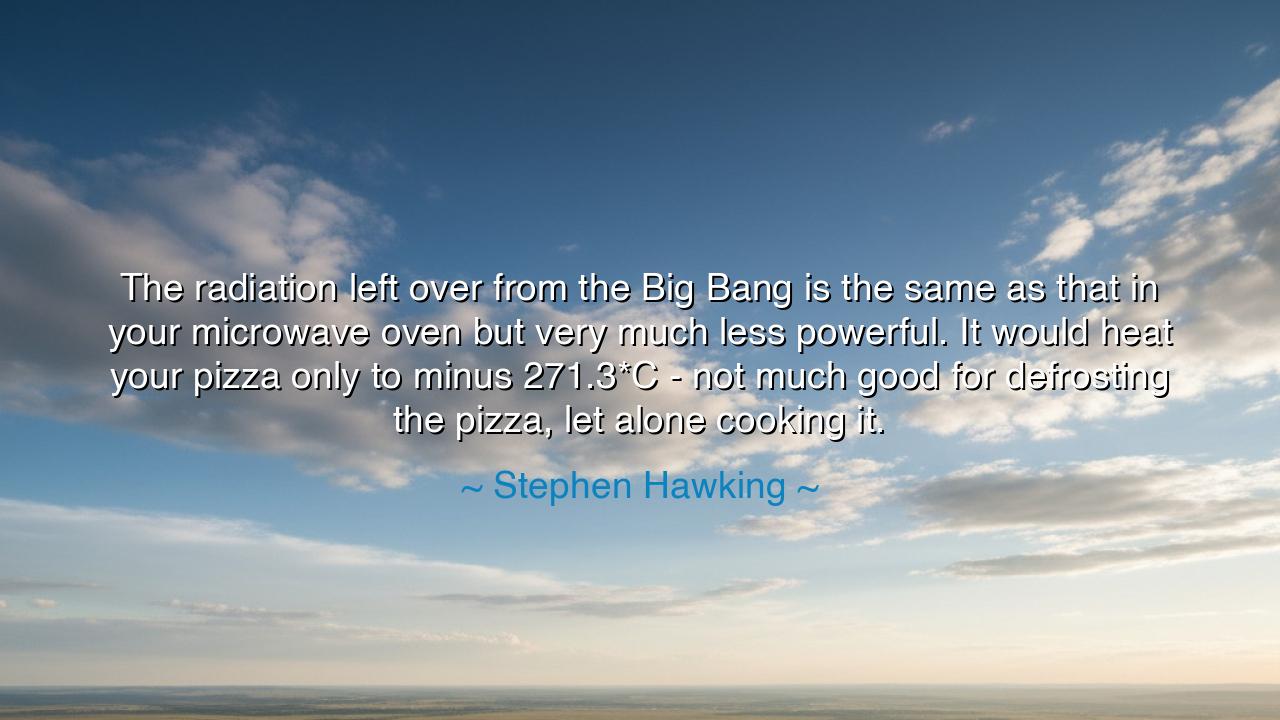
The radiation left over from the Big Bang is the same as that in
The radiation left over from the Big Bang is the same as that in your microwave oven but very much less powerful. It would heat your pizza only to minus 271.3*C - not much good for defrosting the pizza, let alone cooking it.






The words of Stephen Hawking — “The radiation left over from the Big Bang is the same as that in your microwave oven but very much less powerful. It would heat your pizza only to minus 271.3°C — not much good for defrosting the pizza, let alone cooking it.” — are at once scientific and poetic. Cloaked in humor, they conceal a revelation about the universe, creation, and humanity’s quest to understand the infinite. Hawking, master of both intellect and wit, uses the humble microwave oven and the simple act of warming a pizza to illuminate one of the most profound discoveries in cosmology — the lingering echo of the Big Bang, the ancient light that whispers of the birth of all things.
To understand the depth of this saying, one must first see beyond its jest. The radiation Hawking speaks of is the Cosmic Microwave Background, the faint afterglow left behind when the universe was born nearly 13.8 billion years ago. This ancient energy, stretched thin by the vast expansion of space, still fills the heavens today — a silent, invisible reminder that we are all children of fire. Its temperature, close to minus 271.3°C, lies only a few degrees above absolute zero, the coldest possible state. Though unimaginably weak, it carries within it the memory of creation itself — the first breath of the cosmos, echoing softly across eternity.
When Hawking compares this cosmic relic to the microwave oven, he does more than simplify science for the listener — he bridges the infinite and the familiar. The same kind of radiation that once illuminated the newborn universe now sits quietly in our kitchens, used to warm a meal. Yet in the comparison lies a cosmic irony: the oven’s microwaves, intense and focused, can heat our food, while the universe’s microwaves, vast and ancient, cannot even thaw a slice of pizza. In this contrast, Hawking invites us to marvel at both the grandeur and the delicacy of creation — that the universe’s first light still lingers all around us, too faint to warm, but powerful enough to tell the story of existence.
The origin of this understanding lies in one of the greatest scientific discoveries of the twentieth century. In 1965, two radio engineers, Arno Penzias and Robert Wilson, detected a strange, persistent hum of microwave noise in their antenna. They tried everything to eliminate it — cleaned their instruments, chased away nesting pigeons, even doubted their own equipment. Yet the hum persisted. What they had stumbled upon was the Cosmic Microwave Background, the leftover radiation predicted by earlier theorists. This discovery confirmed the Big Bang Theory, changing forever our view of the universe. Hawking’s remark, then, is a tribute to this cosmic whisper — to the quiet evidence that the universe once blazed with unimaginable heat and now hums with the faint afterglow of its beginning.
But beyond the science lies a deeper philosophy. Hawking’s humor carries an undertone of wonder — a reminder that the extraordinary often hides within the ordinary. The same laws that govern the galaxies govern the glow of a kitchen appliance. The same energy that birthed the stars now flickers in our machines. In this way, Hawking calls us to humility: to recognize that the grand and the trivial are woven from the same cosmic fabric. Our daily lives, our tools, our very bodies — all are threads spun from the same primordial light. To grasp this is to feel both awe and kinship with the universe, to know that the human story is not separate from the cosmic one.
There is also in this quote a subtle reflection on scale and significance. The vastness of the universe dwarfs us, yet the human mind can comprehend it — even jest about it. That is our paradox and our triumph. Though we are small, we are capable of great understanding. Though the cosmic radiation cannot heat a pizza, it warms the mind with knowledge — a fire far brighter than any star, for it burns within the soul of humanity. Hawking, through humor, teaches that the quest for knowledge is itself a sacred act, one that transforms isolation into wonder, and cold data into the warmth of insight.
The lesson, then, is this: seek wonder in what seems mundane, and humility in what seems grand. The universe speaks not only through thunder and fire, but through quiet light and faint whispers. Every object, every force, every fragment of energy holds a story of cosmic birth and transformation. Learn to listen. Let curiosity guide you, for even the smallest discoveries can reveal the face of eternity. And when you gaze into the ordinary — the hum of a microwave, the glow of a screen, the silence of the night sky — remember that you are gazing into the same energy that once birthed the stars.
So, O seeker of knowledge, hear the wisdom hidden in Hawking’s jest. The universe is vast beyond measure, yet it hums around you, through you, within you. Its radiation cannot cook your food, but it can nourish your soul with awe. For in the end, the true warmth of creation is not in its heat, but in the fire of understanding — the eternal light that burns in the human spirit, kindled by curiosity, sustained by wonder, and destined to outshine the stars themselves.






AAdministratorAdministrator
Welcome, honored guests. Please leave a comment, we will respond soon